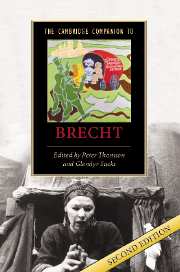Book contents
- Frontmatter
- Part I Context and Life
- Part II The Plays
- 4 Brecht’s early plays
- 5 The Threepenny Opera
- 6 Brecht’s clowns: Man is Man and after
- 7 Learning for a new society: the Lehrstück
- 8 The Good Person of Szechwan
- 9 Mother Courage and Her Children
- 10 Life of Galileo: between contemplation and the command to participate
- 11 The Caucasian Chalk Circle: the view from Europe
- Part III Theories and Practices
- Bibliography
- Index
- Series List
9 - Mother Courage and Her Children
from Part II - The Plays
Published online by Cambridge University Press: 28 March 2007
- Frontmatter
- Part I Context and Life
- Part II The Plays
- 4 Brecht’s early plays
- 5 The Threepenny Opera
- 6 Brecht’s clowns: Man is Man and after
- 7 Learning for a new society: the Lehrstück
- 8 The Good Person of Szechwan
- 9 Mother Courage and Her Children
- 10 Life of Galileo: between contemplation and the command to participate
- 11 The Caucasian Chalk Circle: the view from Europe
- Part III Theories and Practices
- Bibliography
- Index
- Series List
Summary
Mother Courage and Her Children was written in 1938 and 1939 at a particularly difficult time for 'progressive' or 'radical' writers, especially those with affinities with the avant-garde of previous decades. Politically, in the face of rampant Nazism and fascism, Stalin had decreed that Communists must work for a 'popular front' of anti-fascist forces, which seemed to require artists to seek new forms of 'popular culture'. But in Soviet Russia, there was no such 'popular front', and the slightest deviation from the increasingly tortuous 'Party line' was being viciously stamped on. The Great Terror and the Show Trials silenced all dissent at home and left foreign well-wishers baffled.
Meanwhile, the Party's artistic line caused fearsome debate to rage about the nature of progressive, especially Communist, literature, and Brecht found his own ideas frequently denigrated and his work dismissed in circles where he ought to have felt welcome. The debate centred on notions of 'reality', and the writers' relationship to it. The period of mass industrialisation, as Marx had pointed out in The Communist Manifesto, was characterised by 'constant revolutionising of production, uninterrupted disturbance of all social conditions, everlasting uncertainty and agitation . . .' If contemporary life was fragmented and chaotic - and modernist writers and artists agreed that Marx was correct about this - how should they deal with this phenomenon? Various methods were tried: many of the 'isms' of twentieth-century art, futurism, imagism, cubism, constructivism and others, began as fresh attempts to penetrate the fragmentation.
- Type
- Chapter
- Information
- The Cambridge Companion to Brecht , pp. 132 - 142Publisher: Cambridge University PressPrint publication year: 2006
- 1
- Cited by



